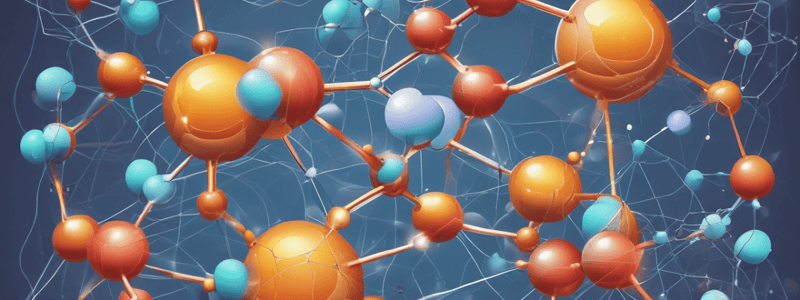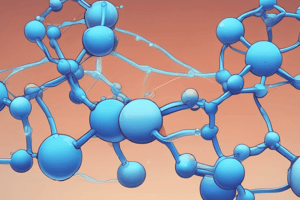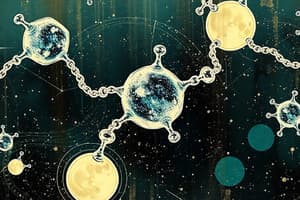Podcast
Questions and Answers
What is the primary reason for the formation of hydrogen bonds?
What is the primary reason for the formation of hydrogen bonds?
- The sharing of electrons between two atoms
- The formation of a covalent bond between two molecules
- The partial positive charge on a hydrogen atom (correct)
- The high electronegativity of the atom bonded to hydrogen
What is the typical range of bond energies for hydrogen bonds?
What is the typical range of bond energies for hydrogen bonds?
- 5-30 kJ/mol (correct)
- 100-200 kJ/mol
- 0.5-5 kJ/mol
- 50-100 kJ/mol
What type of hydrogen bond occurs within a single molecule?
What type of hydrogen bond occurs within a single molecule?
- Covalent
- Intermolecular
- Intramolecular (correct)
- Electrostatic
What is the primary role of hydrogen bonds in DNA?
What is the primary role of hydrogen bonds in DNA?
In proteins, hydrogen bonds help to stabilize which level of structure?
In proteins, hydrogen bonds help to stabilize which level of structure?
What is another role of hydrogen bonds in proteins?
What is another role of hydrogen bonds in proteins?
Flashcards are hidden until you start studying
Study Notes
Hydrogen Bonds
Formation
- Hydrogen bonds are formed when a hydrogen atom bonded to a highly electronegative atom (e.g. oxygen, nitrogen, fluorine) interacts with another electronegative atom.
- The electronegative atom pulls the shared electrons closer, creating a partial positive charge on the hydrogen atom.
- This partial positive charge is attracted to the partial negative charge on another electronegative atom, forming a weak electrostatic bond.
Strength
- Hydrogen bonds are relatively weak, with bond energies ranging from 5-30 kJ/mol.
- They are weaker than covalent bonds but stronger than van der Waals forces.
- Hydrogen bonds are responsible for the high boiling points of water and other molecules.
Types
- Inter molecular hydrogen bonds: occur between two separate molecules.
- Intra molecular hydrogen bonds: occur within a single molecule.
Importance in DNA
- Hydrogen bonds play a crucial role in the structure and stability of DNA.
- Hydrogen bonds between the nitrogenous bases (A-T and G-C) hold the two strands of DNA together.
- The strength of these hydrogen bonds is responsible for the melting temperature of DNA.
Role in Protein Structure
- Hydrogen bonds help to stabilize the secondary, tertiary, and quaternary structures of proteins.
- Hydrogen bonds between the amino acids and water molecules help to maintain the native conformation of proteins.
- Hydrogen bonds also play a role in protein-ligand interactions and enzymatic catalysis.
Hydrogen Bonds
Formation
- Hydrogen bonds form when a hydrogen atom bonded to a highly electronegative atom (oxygen, nitrogen, fluorine) interacts with another electronegative atom, creating a partial positive charge on the hydrogen atom.
- The electronegative atom pulls shared electrons closer, resulting in a partial positive charge on the hydrogen atom, which is then attracted to a partial negative charge on another electronegative atom, forming a weak electrostatic bond.
Strength
- Hydrogen bonds have bond energies ranging from 5-30 kJ/mol, making them weaker than covalent bonds but stronger than van der Waals forces.
- The strength of hydrogen bonds is responsible for the high boiling points of water and other molecules.
Types
- Inter molecular hydrogen bonds occur between two separate molecules.
- Intra molecular hydrogen bonds occur within a single molecule.
Importance in DNA
- Hydrogen bonds between nitrogenous bases (A-T and G-C) hold the two strands of DNA together.
- The strength of these hydrogen bonds determines the melting temperature of DNA.
Role in Protein Structure
- Hydrogen bonds stabilize the secondary, tertiary, and quaternary structures of proteins.
- Hydrogen bonds between amino acids and water molecules maintain the native conformation of proteins.
- Hydrogen bonds play a role in protein-ligand interactions and enzymatic catalysis.
Studying That Suits You
Use AI to generate personalized quizzes and flashcards to suit your learning preferences.




